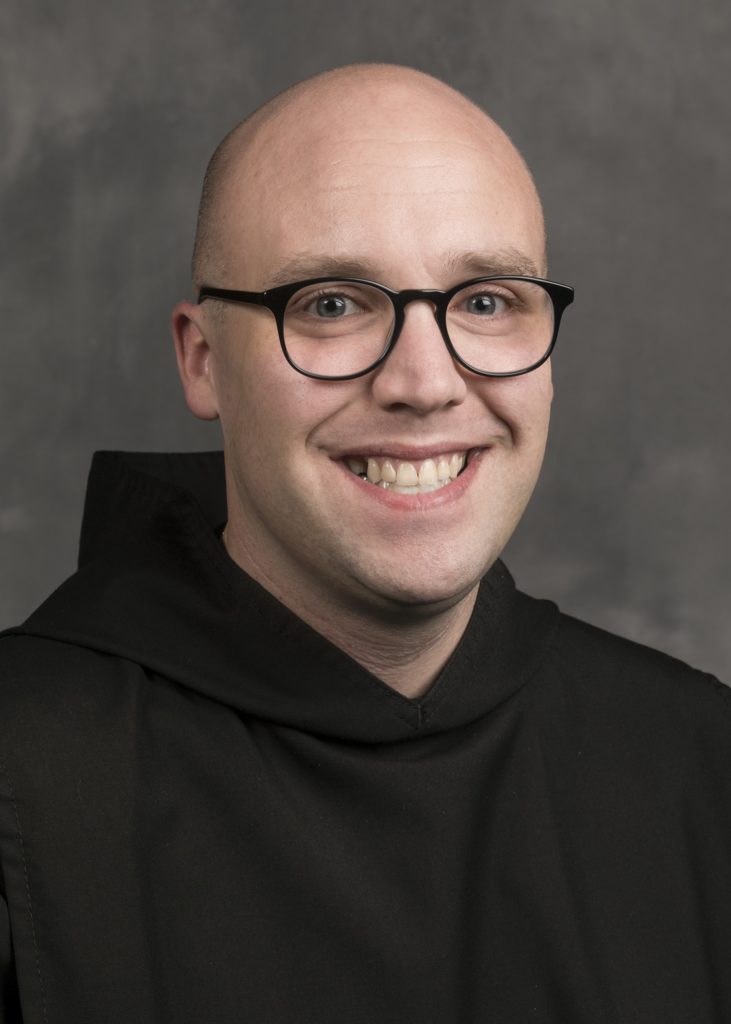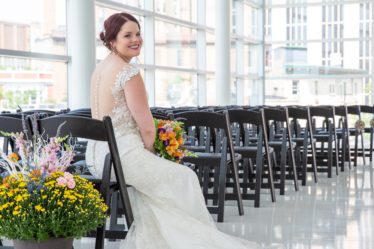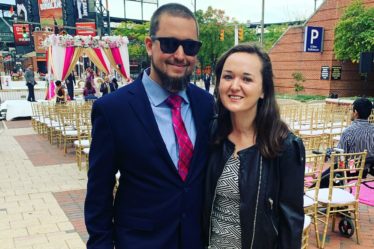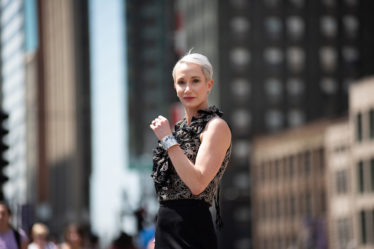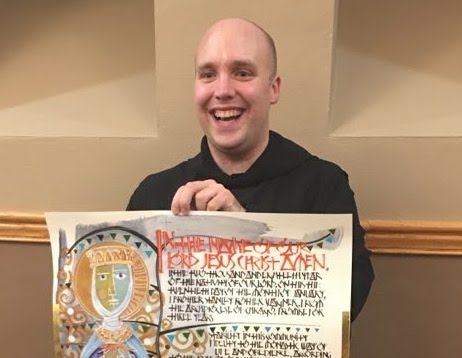
An interview with a Benedictine Monk and two-time cancer survivor
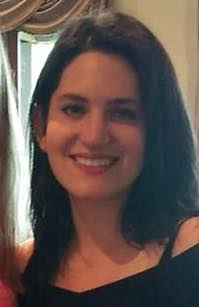
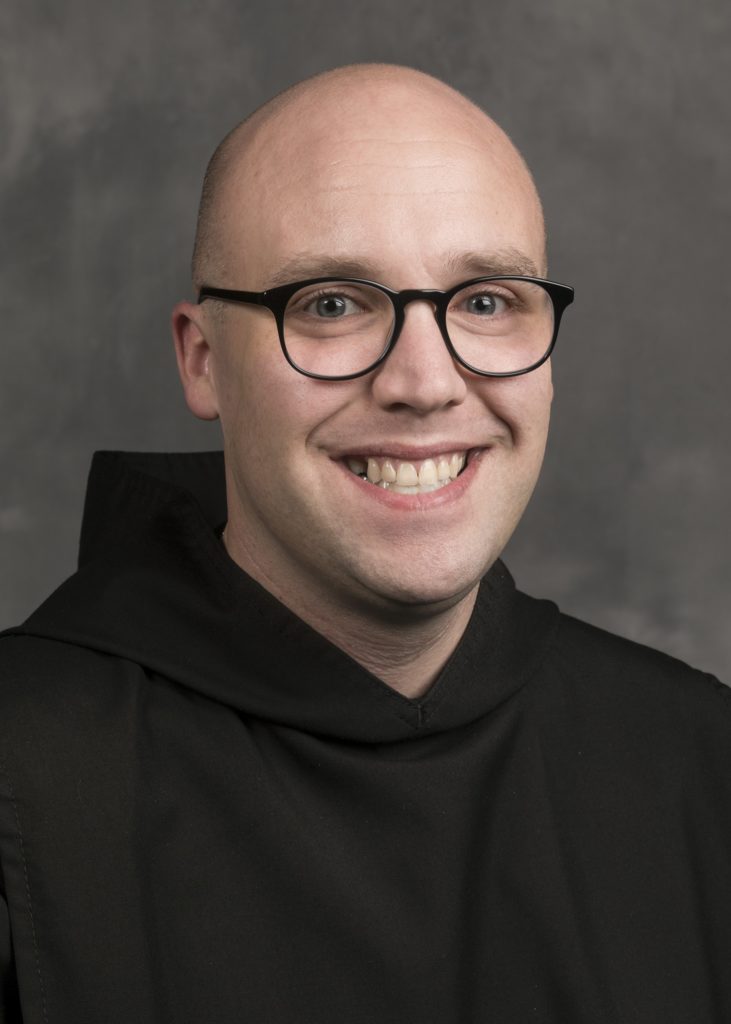
Stanley R. Wagner, Jenna Lindman
I have an amazing friend who also happens to be a two-time cancer survivor, Brother Stanley Rother Wagner. Brother Stanley and I met when we both attended Quincy University, back then he wasn’t a monk yet and I called him Joe. When Joe and I met, we become instant friends; Joe was driving me and some friends somewhere in his Silver BMW and he turned on Billy Joel (which we both happened to fanboy over at the time). We sang along to whatever song was on, and that sealed the deal. We have been friends since.
When Joe and I first met, he was just ending his second battle with cancer. I had such admiration for him. It was amazing to me that he was so young and he had beat cancer twice, managed to have a social life, and somehow go to class and do well in them. At the time I was perfectly healthy yet still couldn’t manage to do half the things he did. I remember thinking what strength he must have and that I could never get through one cancer diagnosis, let alone two.
Although life has taken Joe and I in vastly different directions, across different states we still remain close friends. I think that our bond is actually closer now than ever, we’ve both grown so much and it’s been amazing to share our journeys with one another. I was honored when Joe agreed to an interview with me. His experience is unique, inspiring, and worth your time to read. Thank you, Brother!
Would you tell us a little bit about you, your age, what you do and what type of cancer you had?
Well, my name is Joe Wagner but in religion my monastic name is Brother Stanley Rother Wagner. I’m a Benedictine monk of Saint Meinrad Archabbey in southern Indiana. That’s who I am. What I do, I have about seven jobs in the monastery. But my three main jobs are: assistant to the archivist, oblate novice mentor and master of ceremonies three. I am 31 years old right now and I’m planning for my 32nd in November! The reason I saw planning for my 32nd birthday is because I don’t really take birthdays for granted anymore.
When I was 17 I was diagnosed with non-Hodgkin’s Lymphoma and I went through a year of chemo. And aside from having an ischemic stroke, my year of chemo was not that bad, so I was very blessed in the respect. And then about a year and a half later I was diagnosed with Hodgkin’s disease which is the less severe form of lymphoma and I underwent 5 weeks of radiation for that. So my last day of radiation was actually my 20th birthday in 2007. I had been cancer free since November 16th 2007.
You mentioned you had a stroke during your first go with cancer. What happened there?
So, part of my chemo regimen was getting methotrexate intrathecally. I had a cancer drug put into my spine once every three weeks. It was towards the end of July 2005 we got a new doctor into the clinic and he had just finished his pediatric oncology fellowship. Maybe he was a bit inexperienced to do a spinal tap. They didn’t have me curl up far enough and he kept trying to get the needle into the spine and it wouldn’t go in, so he just kept jabbing it repeatedly. It wouldn’t go in. For about a week [after] I had terrible headaches to the point where if somebody was crumpling up a plastic bag it was excruciating. I just assumed that it was a side effect of chemo. I didn’t have a lot of bad days up until that point but I knew that they would come, so I just assumed that was it. Maybe about a week after the botched spinal tap, I was in my house and I was on the recliner watching television. It was about 9 o’clock at night and I was leaning on my arm. I noticed that it was my left arm, and I noticed it was falling asleep. So I got up and walked around went to the bathroom but I noticed the tingling sensation was not subsiding it was just getting a lot worst. It was going into my chest, then down into my leg into my foot and then up to my face. I was freaking out, I didn’t know what was going on, I thought I was having a heart attack. I found my dad and I said, “Dad I think we should go to the hospital,” of course it was affecting my speech as well. When we got to the hospital they said I was having a series of mini strokes. Ischemic strokes are when there is a blockage in one of the main arteries in your brain, so that’s what I had. That was July 31 2005 and I was in the hospital for about four days to recover. The only side effect that I had from that was for a period of about nine months I was able to do algebra. As soon as I stopped chemo I lost the ability to do algebra.
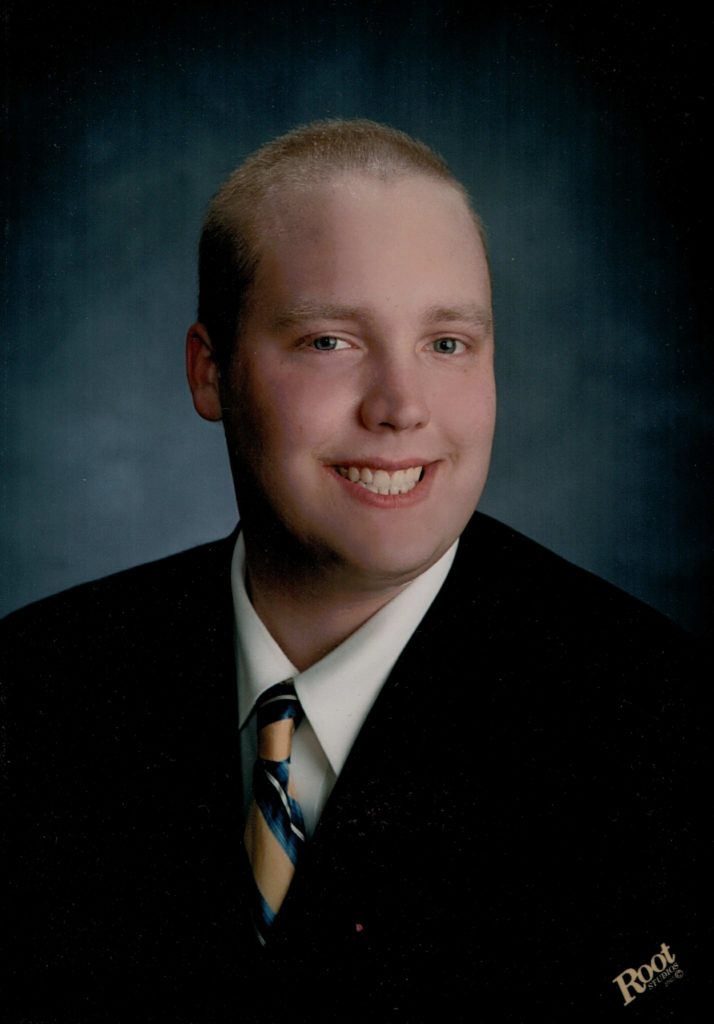
Really? That’s quite interesting!
Yes, well I didn’t say I did algebra well – but I was doing algebra.
Haha. Do you miss doing algebra?
That would be a no, haha.
I do have to ask, the stroke that you had in that something that is more rare when you get chemo through your spine or is it something that is known about in the medical community?
I think because my chemo treatment was botched it was an exception. I would not call that normal.
Leading up to your first diagnosis, what were the characteristics of the cancer you had and how did you find out you had it?
About four months before I was diagnosed I noticed there was a lump in my right armpit. It was about half the size of a grapefruit. I think I had it for two days, I told my parents and they were like, “yeah, that doesn’t look normal.” We went to my mother’s union doctor- and talk about a quack. Seriously. He sent me to this hospital that I would not send a dog to in the Chicago area. I won’t say the name of it. But it is a really bad hospital. We left the ER after two hours of waiting and we went to a different hospital where in the emergency room they had lanced it, they drained it, and I was in the hospital for about three days doing antibiotics. Well, the problem is after I had left the hospital that January, the wound wasn’t closing properly. I was getting weaker, I was getting lethargic. I was a junior in high school at that point. I was falling asleep in class. It wasn’t very good. I was getting paler every day. Finally, the dean of discipline at my high school told me, “You’re gonna go see a doctor and you’re gonna get a note that say you can come back because if you don’t go see a doctor I’m not letting you into this school tomorrow.” So I saw the doctor he said, “it doesn’t look good, it’s not the worst I’ve ever seen. So I’m going to give you these antibiotics and come back in a week and we will see what happens.”
April 30th of 2005, I noticed that my right arm was swelling and that’s when my grandfather and father decided to take me to the emergency room. Of course, everyone in the emergency room was like, “Why didn’t you come in sooner?” Well, I get worked up easily around doctors, so if I can avoid the hospital, I will. The surgeon took a look at it and said, “It’s not great, but on a scale of one to ten it’s a five.” There was a lot of hope there. I wasn’t too worried. I just thought they were going to clean the wound out and send me home. I was about ready to go home when this doctor came in to examine me and just like all the other doctors before him, he listened to my heart rate, he checked my pulse, felt around in my axila and my abdomen. Right before he came in a was talking to another doctor and I asked, “Who’s that?” The other doctor said, “he’s our head of pediatric oncology. We bring him in on cases like yours all the time, it doesn’t mean you have cancer.” Well, ten minutes later i found out I had cancer. I cried for about a day and a half because the only word in my mind was cancer or lymphoma. What I neglected to remember is the the same oncologist who diagnosed me on May 5th, 2005 at three o’clock in the afternoon also said you have a 99% survival rate over five years. I didn’t hear that, all I heard was cancer. Every doctor that came into see me, they all said if we had to have a cancer we’d pick lymphoma because it’s easily treatable and easily beatable. Again, I didn’t hear this. All I heard was cancer. Lymphoma. After that day and half of crying I snapped out of it, I was cracking jokes again. I remembered 99% survival rate, I’ll be okay. Sure enough I was. I had excellent doctors, I had wonderful nurses who I still stay in contact with after 14 years. I had a really good support system with my family my friends and my classmates.
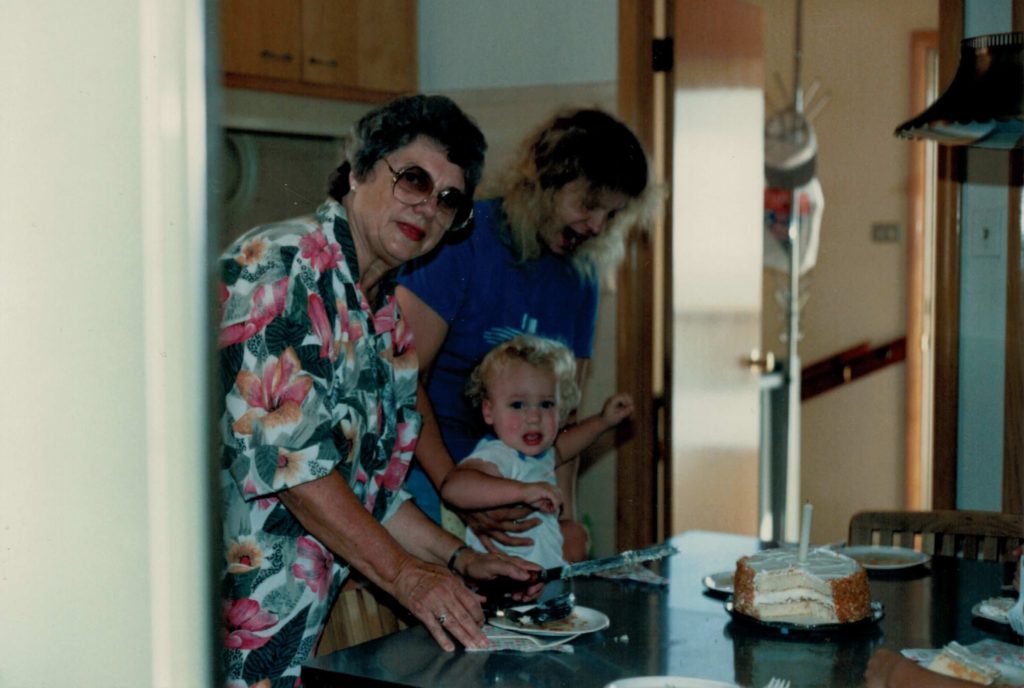
Wow, so you described your emotions the first time you were diagnosed. What were your emotions the second time?
Oh boy, the first time it was confusion sadness and not so much anger. The second time it was more hopelessness. I’m kind of a rare case with how I got the lymphomas, I got them out of order. My doctors weren’t convinced that I had the less severe form the second time so they triple checked the pathology results. For three weeks this kept going back and forth and the doctors were like, “the tests are inconclusive, we’re sending them off to the specialist.” I was like for crying out loud, even if it’s bad news [just] tell me that it’s bad news so I can be at peace with it.
It was kind of funny how i found out. I found out from my dad I had cancer. He was getting real tired of the doctors, so without telling me he called my doctors and asked what was going on they said, “Well it is cancer, the problem is we don’t know what kind of lymphoma it is.” So they sent it to a specialist at the mayo clinic and a specialist at the university of chicago. Sure enough, it was Hodgkin’s disease, the less severe form of lymphoma. I knew something was wrong when I went to the mailbox at Quincy University, Go hawks, and I pulled out a slip saying that i had a package. It was an Amtrak ticket and I knew what that meant – I had another doctors appointment that I didn’t know about. I called my father and I said, “Why am I holding an Amtrak ticket in my hand?” He said, “Oh, well the doctor hasn’t called you apparently. So, your cancer is back, but you only have to do about a month of radiation and they are trying to get the paperwork setup so you can do it in Quincy without missing school.”
I was a sophomore in college at the time. I was angry at my father because he went behind my back but I was also really happy that my father went behind my back and did that. When my doctor finally called and told me the news I told him, “I already know what’s going on.” He just confirmed what my dad said. He said we are trying to make it so you don’t have to miss any school to do this. I’m like okay, well that’s nice. My one friend was with me this whole time. He and I bought a bottle of UV green apple to celebrate and at one point I was sitting on the floor and I was saying, “God, you’re not taking me yet.” The next day was a Saturday, I was relieved and happy that I finally had an answer. Yes, I was angry and I was also happy and excited. I wasn’t feeling one emotion at one point. I was feeling different emotions at the same time and I think that’s completely normal. I didn’t have the vocabulary to express it when I was 20, but now at 31 I can say I was being a human being.
Going back, the second time, how did you know something was wrong?
I did not know anything was wrong. I went in for a routine PET scan as a part of my 6 month check up. And there was “increased activity on the scan” in my right axilla, my right armpit, which is where the cancer was originally. My oncologist assumed it was just scar tissue because to this day my armpit is cavernous from all the muscle taken out. They saw how it was growing on the scan over a period of a year and a half. So they said, “We’re just gonna go in there and get a biopsy. We don’t think it’s cancer because you’re not showing any symptoms but we’d rather be safer than sorry. So of course the surgeon got in there and it was a same-day surgery. He came to me as I was coming out of anesthesia and he said, “I take out a lot of ugly crap, and I’m gonna say that you’re cancer’s back.” Very matter-of-fact, very surgeon-like. I was like, “Wow, okay.” I was just stunned. I had a biopsy done in the Chicago suburbs in a hospital and my parents that night drove me back to Quincy, so that’s about a five hour trip. I was crying the whole way. It was after that biopsy that the three weeks of not knowing anything followed, and then after that the definitive diagnosis with the less severe form of lymphoma. I didn’t have any symptoms leading up to the second diagnosis, but during the routine scan my doctor [decided] to be safe and I’m glad that they did.
I’m glad they did too. You told your friends and family, how did your family take it? How did you tell your friends and how did they take it?
No one has ever asked me that before. Looking back on it, and I don’t want to downplay the severity of getting a cancer diagnosis, but my family is used to having really bad health so for my family it’s just like this really sucks but we’ve done this before and we’re going to get through this, just a very german kind of mindset. For my family it was just a matter of efficiency. I don’t want to make my family sound like a bunch of automatons, it was comforting that it’s just like, “Okay, we’ve done this before, we know what we’re doing, let’s do it.” For me, I appreciate that kind of efficiency and that was comforting to me.
When I told my friends, of course they were nothing but supportive at the time. I had a number of them offer to drive me to the cancer center in Quincy even though it was not even a mile drive to the center from the university’s campus. I could easily drive myself, but I gave my friends something to do and they felt that they were helping. I think the big show of support with me was my professors during that time. Especially Dr. Wendell Mauder, who was one of my history professors. He’s a very strict, hard grader. Yet also a very understanding man, he was very gentle with me during that time when it came to assignments and attendance and class. The other professor was Wally Carlson who was the speech professor, such a great guy. Wally is now a retired pastor from the United Methodist Church, but Wally was just there for me during some very dark moments and even though he was my professor I had someone to talk to and someone I could just vent to. To this day Wally and I are still very good friends and I’ve sought him out on a number of spiritual dilemmas I’ve had, even as a Catholic. I greatly love and respect Wally and Dr. Mauder and of course my friends during this time too. I was blessed with a very good support system with family, friends, and professors.
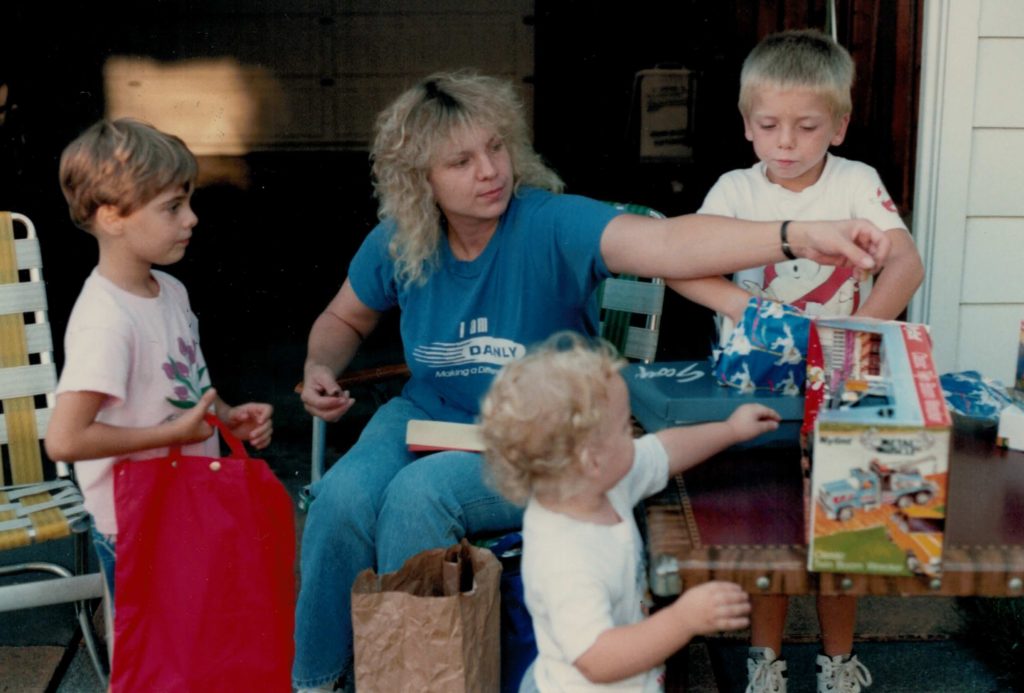
You had that support system, you were going through school for both diagnosis. Was it difficult to manage school work and going through treatment and dealing with side effects?
Yes it was, but not in the way that I think is the general experience for most people. For me, I’m naturally intelligent. If i hear or read something once, my mind’s a sponge and I remember it. I rarely did reading homework in college, the only assignments I worried about were assignments I had to turn in. In that sense, school work took my mind off of the diagnosis. Not so much in high school, high school I was a terrible student. College I got more serious. So, I’m talking about college level. For me, it was nice to have the school work as a distraction. And actually at that point I had my best semester GPA-wise. I just threw myself into my school work to give me a distraction. With regard to my social life, I certainly partook in a couple of, shall I say, “adult beverages” before I was of age. Especially during that time. Not very often, maybe once every two weeks I went out with my friends and kind of “painted the town red” as the old cliche goes. My social life and hanging out with friends gave me distraction in that time and I think that my friends knew that. I don’t have any recollection of them bringing up my cancer treatment explicitly during that time. I did what I had to do, school work, went out, or watched TV.
You are faithful, you’ve been involved with the Catholic Church for your entire life. I know that you graduated from Quigley, Quincy, and you have two masters degrees from religious schools. What role did faith play in your journey with cancer? I know you mentioned you were angry with God, how did you get through that and how did it strengthen your relationship with God?
Shameless plug, I’m giving a retreat next month here at Saint Meinrad on the spirituality of history. Call the guest house if you want to sign up! Anyway, the overarching theme of my retreat is the greatest sin in the Old Testament is not the Israelites making a golden calf and worshiping it in place of God, it’s not David having Uriah killed just to sleep with Bathsheba , It’s not the Israelites repeatedly turning away from god, it’s not the Israelites forsaking God. It’s the Israelites not remembering God. The Bible is a book of remembrance, it’s not a history book. A history book contains facts that are interpreted and a narrative flows from that. The Bible is a collection of different genres of books, it’s a library. The overarching theme in all of those books is it is our job to remember at all times how good God has been for us. However, sometimes in the present moment, which is the only thing we are guaranteed, we forget that. But having this perpetual awareness of God is supposed to help us remember god and remember all the good that he’s done for us.
There’s an old trite adage, “If God brought you to it, he’ll bring you through it.” I think of it in another way from the second chapter, the book of Jonah, verse 11. “And God spoke to the fish and it vomited Jonah onto dry land.” That’s literally my new favorite verse in the bible because it’s all about us remembering that sometimes our expectations of how things are going to go is not going to be the way that they actually go. Sometimes God is gonna send us a fish to eat us and then the fish is going to regurgitate us and set us back on the way that we need to go. So, I remember at each moment I’ve had a cancer diagnosis or the blood disease I now live with as part of side effects of my cancer treatment, at each moment, in the moment I’ve forgotten God and I’ve forgotten all the good that he’s done for me and how each time he brought me to it he never failed to bring me through it. So, do I get angry at God? Hell yes I do, and that’s perfectly human. Look at the book of Job, Job’s greatest sin by the way is forgetting all the good that God had done for him. And what happens at the end of the book of Job? Job remembers, “Oh yeah, you’re God and I’m a human being. How can I even question you because you’ve done all this good for me.” That’s Job’s “ah-ha” moment. So, people like Jonah and Job and ultimately Jesus just having the awareness of God, that’s what these biblical characters have taught me. And me cultivating and deepening my relationship with christ, especially as a monk, has really encouraged me to remember God and all the good that’s he’s done for me and to trust God. Trust is something that was a very foreign concept for me growing up in my house, so I had to learn that reality as an adult as a monk. I had to trust my superiors, my confreres, I had to trust God, and myself for that matter. What role has faith played for me for the past 14 or so years? Faith has taught me to remember God and to have that awareness of God in all moments in my life, especially in the present moment. And that’s not an invitation for me to live in the past, that’s not living. When Christ says in John 10:10, “I came that they might have life and have it in abundance.” That’s not us wallowing in the past, that’s us being firmly planted in the present moment but looking back over our shoulders and seeing God pass by. We don’t see God in the present moment sometimes, so we need to look back [and see him]. That gives us strength for the future too. That’s the role that faith has played for me.
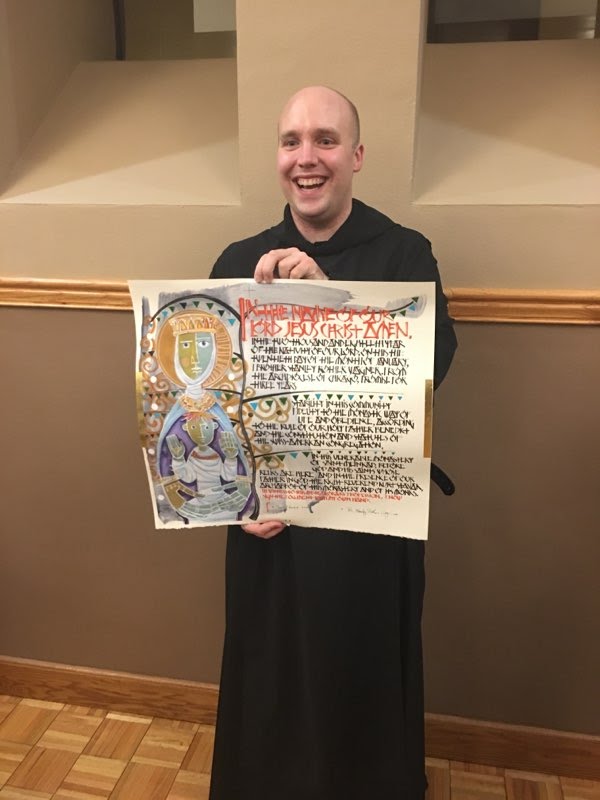
Thank you for sharing that. Would you say that your journey with cancer ultimately strengthened your relationship with God?
Oh yes, absolutely. And I know there may be some people who don’t do the God thing, and I can understand, why would you? I was giving a talk to some university students about two weeks ago in Nashville, Tennessee, and I was telling them how when there was that massacre at the Mosque in New Zealand how I was praying in our abby Church one morning and I just started crying because I was like, “What is so fucking difficult about love God and love your neighbor as yourself.” I can see why people don’t want to believe in God. What kind of goodness is there in the world? There is goodness in the world. And yeah, people die from cancer, but we all are going to die one day, that’s just the way things are right now. But there’s a lot of hope as well.
I’m really big into genealogy. I just found the 21st great grandfather from back in the 13th century, and I wonder what it was like for him to think about the future. Did he even have a concept of me researching about him? And I think about that, I’m obviously a monk, I will not have a wife, I will not have kids, at least I’m not planning on it. But I have my community. What will my community look like in 300 years? I have that hope in God, that God is going to provide, that God has provided and he will provide. It just speaks to the timelessness of God. It says in the Psalms, “God chastises the ones that he loves,” well he must love me a lot. I think that there is some truth to that and we do have to find meaning in our suffering. For me, it’s been God. For somebody else it could be Allah, or for somebody else it may not be God, it may be something completely different. And that’s okay, and I think that that’s beautiful.
That was beautiful authenticity, Joe. Thank you for that.
Humility and authenticity are the same word.
Wow, I never thought about those words being synonyms. Turning away from that a little bit, while you were going through treatment, I hear echoes throughout the community that sometimes people trying to be helpful will offer advice. Was there are terrible advice that anyone gave you while going through cancer treatment?
Hahaha. I wouldn’t call it terrible advice, but not something you should share with someone who was just diagnosed with cancer. My sister was telling me a story about one of her friends that was diagnosed with the same kind of cancer I had. She said, “You know Ms. Diane? She had the same kind of cancer but it’s literally all over her body and it’s probably gonna take her, you should just be prepared.” I’m like, “Okay, shit, thanks.”
A piece of wise advice I received from the rector of my [seminary] high school, Father Peter. He said, “Take advantage of sick days, but don’t take advantage of them.”
Earlier you spoke about living in the moment. Do you think that learning how to live in the moment comes from facing a hardship?
Yes, absolutely. I’m full of old cliches tonight, “A smooth sea never made a skilled sailor.” If you’ve never been tried, how are you expected to be knowledgeable about things? It says, I think in Isaiah, when Isaiah is writing about the suffering servant, he said he “was a man acquainted with our infirmities” and he’s talking about Jesus Christ. Jesus Christ took on our humanity in full in all things but sin, but he was still tested he was still tempted. What is the point of having a God-man as a savior if he doesn’t know what we’re going through as human beings? Jesus was made obedient to the point of death, even death on a cross. During this Easter time that’s something to remember. Christ rose because he died for all the crap in our lives because he experienced it first hand. Jesus got angry, Jesus got hungry, Jesus got hangry! The story of the Big tree, he ordered it to wither up because there was no fruit on it. Jesus got hangry, yo! It’s real, Jesus cried when Lazarus died. That’s real. What is the point if you’ve not being tested? And i’m not poo-pooing anyone who has not been tested, but you need to know what you’re doing if you expect to be a leader. We are all called to be leaders, and learn from each other and our lessons. We are called to be leaders for each other and ourselves. For us to be leaders we need to be acquainted with infirmities just like Jesus.
Wow, thanks for talking about that. And I don’t think it’s cliche, I think it’s something we need to always revisit- being in the moment. So, you’ve been in remission for a while now, but are there any side effects of cancer that you still live with?
About six months before I was diagnosed the first time, there was a new drug that came on the market I was given called Rituxin, and Rituxin does a really good job of targeting just the cancer cells in the body. I had tremendous energy on it. The long term side effect of it though is that it has lowered my globulin levels to dangerously low. So [my defenses] are really low. A side effect of having really low globulin is sinus infections, I get four sinus infections a year, I am down when I get a cold. In winter and in summer. That’s a side effect that I still live with. I go in once a month to the local cancer center and I get globulin infusions. It’s kind of like chemo, I go into the center, they hook me up to an IV and I’m sitting in the treatment room for 2-3 hours and I go home and I sleep for about two and a half hours. And then it takes me about a day or two to bounce back.
When did you find out about that?
About a year and a half ago.
Wow, that’s crazy. I’m glad you are doing well though! So, we are reaching close to the end of our interview here. I want to know, are there any resources you think are essential for other people battling to know about?
I would say If you are churchgoing a believing person, go to your clergy. I know a lot of people don’t have a lot of great experiences with their [religious leaders] and I’m sorry about that but if you have someone that you can go and talk to, go to them. I’m all about that life as you know. The other thing at every cancer center there is a social worker. I general do not avail myself with social workers at cancer centers, however they do really good work I would suggest going to the social worker. And if you don’t have a good clergy member to go to, the social worker can find you one. And then if I may be so bold, I offer my services if someone wants to email me, I can try to answer questions, I’m here as a resource. One more: IgniteHope Candles.
Haha, Thank you. We touched on this a little bit, if a friend of yours was diagnosed with the same cancer, what would you want them to know?
I think of the word compassion. And compassion is from two latin words it means “suffering with.” And I think that when we have compassion on people a lot of people in our modern society shy away from that and think of compassion as weakening and it’s like no dude, compassion is literally suffering with somebody. You need a lot of fallopian bravery to suffer with somebody. I don’t like the term testicular fortitude, so fallopian bravery. So I think as a cancer survivor myself, if one of my friends was diagnosed with cancer I would want him or her to know that I am suffering with them because I know exactly what they’re going through. That’s what I would want them to know. But it’s not just a matter of suffering, it’s also rejoicing with them because god only tests the just. God must think you’re a badass if you get cancer because there is a test in there.
Wow, rejoicing with them. I feel like that’s not something I hear. I really like that you said that.
And it’s the little things. Big things are important too, but so are little things. Like hey, I’ve had neuropathy for the past six months and I actually button my shirt today, that’s a really big to someone that has literally had someone else button their shirts for them for the past six months. That’s something that I went through. So the little victories are just as important as the big victories so yes rejoice with your friends.
Is there anything else that is unique about your experience that we should know about or that you really want to share?
I always like telling this story because it just goes to show the personal sanctity of the man. My first time getting diagnosed i was in the high school seminary I was seventeen and it was maybe three days after my diagnosis. I got a phone call from Francis George, who is the former Archbishop of Chicago he died in 2015. Cardinal George himself beside being a survivor of polio was also a survivor of bladder cancer which came back and that’s how he died in 2015. He had just gotten back from Rome, he was one of the cardinals who elected Pope Benedict. So this guy, who literally just elected the Pope, called me on the telephone at my hospital and he talked with me for about 20 minutes just to see how I was to say that he was praying for me and that he knew what I was going through. That meant a lot to me and that’s something I’ll never forget. it was humbling to know that there are people in the world that no matter how important their jobs are at the end of the day we’re all human beings we are here to love one another. I think that’s another lesson I learned. I absolutely hate saying that I hate people. As soon as I say something like that I stop because I’m like no, no Stanley you are called to love this person even though this person is being a raging asshole. So that’s another lesson, loving the people that you really want to hate. Human beings are complicated but not in a complicated way.
Well, Joe, that was a fantastic interview, thank you so much for being so open. I really wanted to get your perspective, so thank you.
